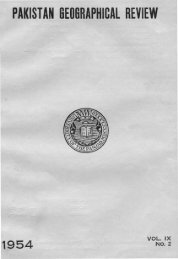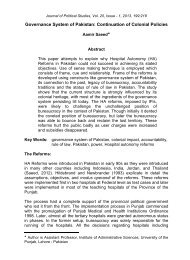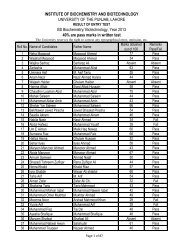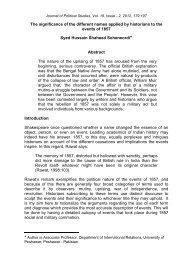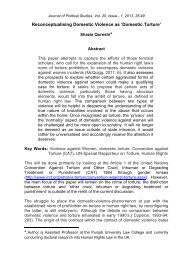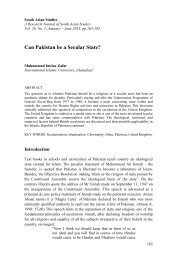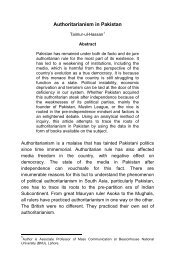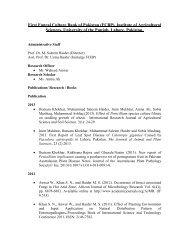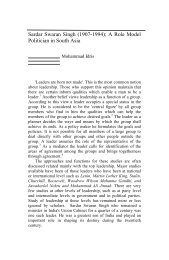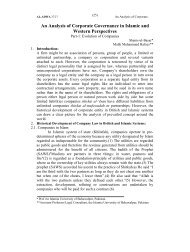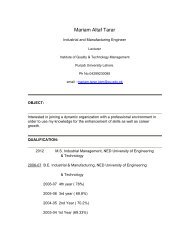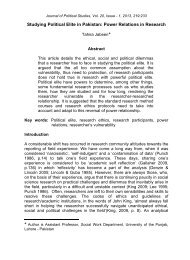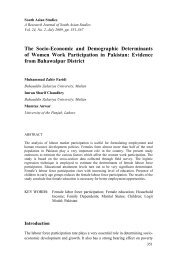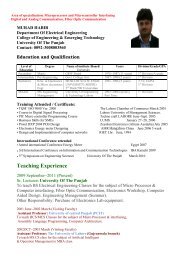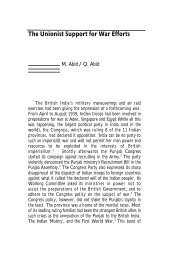4. Dr. Amir M. Haji Yousefi_January-June 2012
4. Dr. Amir M. Haji Yousefi_January-June 2012
4. Dr. Amir M. Haji Yousefi_January-June 2012
You also want an ePaper? Increase the reach of your titles
YUMPU automatically turns print PDFs into web optimized ePapers that Google loves.
South Asian Studies 27 (1)<br />
Afghanistan and does its best to realize the demands of Muslim Afghan people<br />
(Mojdeh, 2009). The Islamic Republic of Iran opposed the Communist coup in<br />
Kabul and this opposition was reiterated even more seriously when the Red Army<br />
occupied Afghanistan on Dec. 1979. Iran was the first state to condemn the<br />
military occupation of Afghanistan by the Soviet Union. The Communist<br />
government in Kabul also considered the victory of the Islamic revolution as a<br />
serious danger next to itself and took a negative position towards Iran. Within a<br />
short time, the two countries deported the others diplomats and many of the<br />
mutual agreements were annulled. It was then when the armed resistance of<br />
Afghan Mujahideens against the pro-Moscow communist regime was formed.<br />
Iranian foreign policy in Afghanistan during the occupation of this country by<br />
the Soviet Union was affected by some factors such as deep concern over the<br />
Soviet threat, Iran’s internal issues and problems resulted from the newly formed<br />
state of the Islamic Republic of Iran and the war with Iraq, and finally the<br />
extensive presence of opposing and rival states such as the U.S. and Saudi Arabia<br />
in Afghanistan. Therefore, Iran’s foreign policy in this period was associated with<br />
some sort of ambiguity and prudence. It may be claimed that the revolutionary<br />
Iran was acting idealistically rather than realistically in its foreign policy regarding<br />
Afghanistan during this period, aimed at preparing the ground for the Soviet<br />
withdrawal as well as securing its status and central role in the post-occupation<br />
state through supporting different Afghan groups affiliated to Tehran such as the<br />
Shiites.<br />
The Mujahideen Government and Internal Turmoil<br />
After the Soviet forces pulled out of Afghanistan on February 15 th , 1989, it took<br />
almost two and half a year for the Soviet puppet regime -Najibullah Regime- to be<br />
ousted from power. In April 1992, the Mujahideen forces seized Kabul and<br />
Sibghatullah Mojaddadi, as the first president of the interim government, came<br />
into power. After serving a two-month term, he transferred power to Burhanuddin<br />
Rabbani, based on a prior agreement reached by Mujahideen. Within the following<br />
four years from 1992 when president Najibullah`s regime was overthrown to 1996<br />
when the Taliban forces took over Kabul, attempts by Mujahideen to bring<br />
stability to Afghanistan was unrewarding. Although the Mujahideen government<br />
was in power, conflicts among numerous Afghan groups impeded the formation of<br />
a national unity government which could bring about stability and security in<br />
Afghanistan (Pahlavan, 1998). Power seeking of some warlords and their affiliated<br />
parties and groups such as Rabbani, Hekmatyar and Ahmad Shah Masoud as well<br />
as foreign meddling in Afghanistan by countries such as the United States,<br />
Pakistan, Saudi Arabia and Iran became the origin for a civil war among various<br />
Afghani groups (Marsden, 1998: 46-49). As civil war became more sophisticated,<br />
Iran’s foreign policy in Afghanistan faced a dilemma. Stressing on the Afghani<br />
people right of self-determination, Iran supported legal governments of Mojaddadi<br />
and Rabbani during the Mujahideen era. Iran was highly concerned about the<br />
internal turmoil in Afghanistan and was trying to bring about internal compromise<br />
among various Afghani groups through planning and holding several meetings and<br />
66



